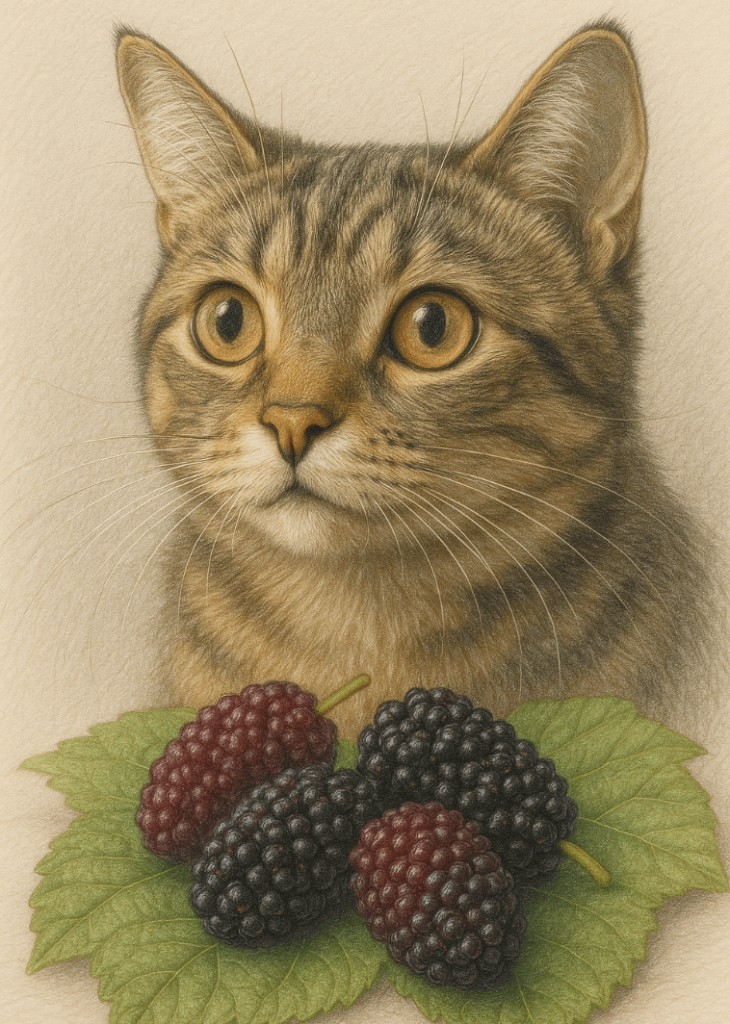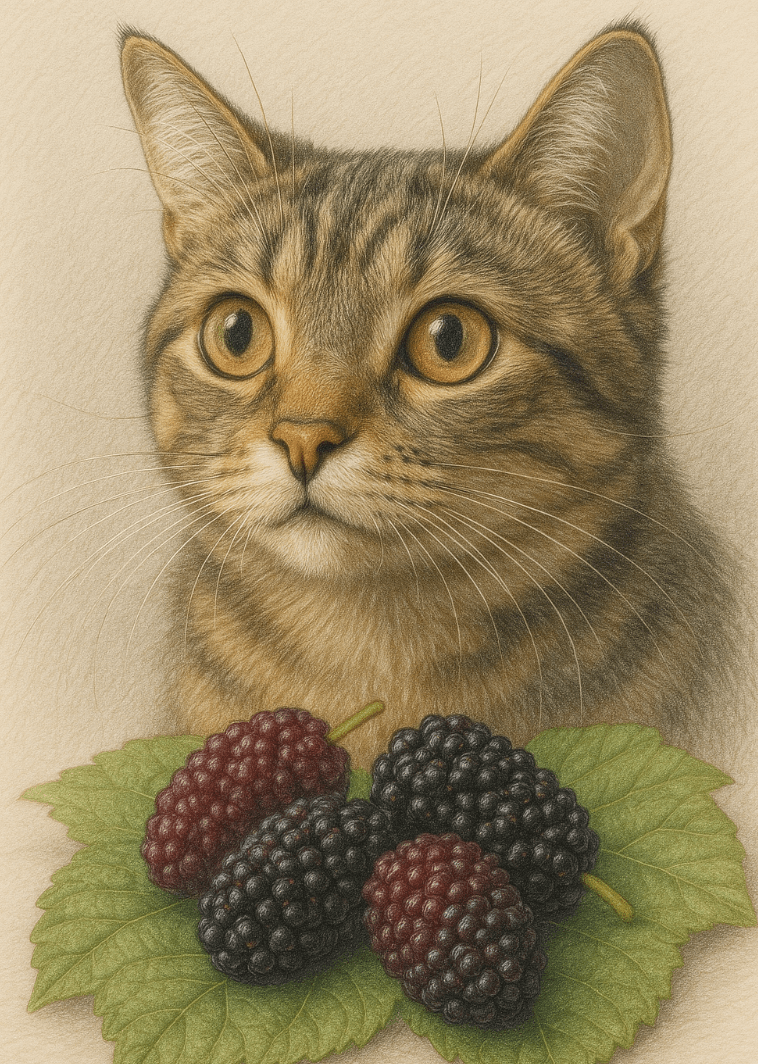Can Cats Eat Mulberries?
Mulberries are a delicious and nutritious fruit enjoyed by humans, but what about our feline friends? If you’ve ever caught your cat eyeing these juicy berries or wondered if they’re safe to share, you’re not alone. While cats are obligate carnivores and don’t require fruits in their diet, some fruits can be offered as occasional treats. However, it’s crucial to understand whether mulberries fall into the “safe” or “risky” category for cats. In this blog post, we’ll explore everything you need to know about feeding mulberries to your cat, from potential benefits to possible risks, ensuring your furry friend stays healthy and happy.
Are Mulberries Safe for Cats?
Before offering mulberries to your cat, it’s essential to determine whether they pose any health risks. While mulberries are generally non-toxic to cats, there are still factors to consider before including them in your pet’s diet.
Non-Toxic Nature:
Mulberries are not listed as toxic to cats, meaning they are unlikely to cause immediate harm if consumed in small amounts.High Sugar Content:
Like many fruits, mulberries contain natural sugars, which can upset your cat’s digestive system if eaten in excess.Potential Allergic Reactions:
Some cats may have sensitivities or allergies to new foods, including mulberries, so introduce them cautiously.Choking Hazard:
Whole mulberries could pose a choking risk, especially for smaller cats, so ensure they are cut into manageable pieces.Digestive Sensitivity:
Cats’ digestive systems are not designed to process large amounts of plant-based foods, which may lead to vomiting or diarrhea.
While mulberries are not inherently dangerous, moderation and supervision are key to ensuring your cat’s safety
Potential Benefits of Mulberries for Cats
Although cats don’t need fruits like mulberries in their diet, there are a few potential benefits to offering them as an occasional treat.
Rich in Antioxidants:
Mulberries contain antioxidants that may help combat oxidative stress and support overall health.Vitamin C Boost:
This vitamin supports immune function, though cats naturally produce their own vitamin C and don’t rely on dietary sources.Hydration Support:
The high water content in mulberries can contribute to your cat’s hydration, especially if they’re reluctant drinkers.Low-Calorie Snack:
Compared to processed treats, mulberries are a low-calorie option for cats needing weight management.Mental Stimulation:
Offering a small piece of mulberry as a treat can provide variety and enrichment in your cat’s routine.
While these benefits exist, they should be weighed against the risks and your cat’s individual dietary needs.
Check this guide 👉Can Cats Eat Snow? Best 7 Expert Tips!
Check this guide 👉Can Cats Eat Kefir? Best 7 Expert Tips!
Check this guide 👉Can Cats Eat Kimchi? Best 7 Expert Tips!

Safe Fruits for Cats | Foods to Avoid Feeding Cats |
|---|---|
Blueberries | Grapes |
Strawberries | Raisins |
Apples (seedless) | Onions |
Bananas (in moderation) | Garlic |
Watermelon (seedless) | Chocolate |
How to Safely Introduce Mulberries to Your Cat
If you decide to offer mulberries to your cat, it’s important to do so safely and responsibly. Follow these guidelines to minimize risks and ensure a positive experience.
Start with a Small Piece:
Offer just a tiny piece of mulberry to see how your cat reacts before giving more.Monitor for Adverse Reactions:
Watch for signs of digestive upset, such as vomiting, diarrhea, or excessive drooling, after consumption.Remove Seeds and Stems:
Ensure the mulberry is free of seeds and stems, which could pose choking hazards or cause gastrointestinal blockages.Avoid Overfeeding:
Limit mulberries to a rare treat—no more than a small piece once or twice a month—to prevent sugar overload.Consult Your Veterinarian:
Always check with your vet before introducing new foods, especially if your cat has pre-existing health conditions.
By following these steps, you can safely incorporate mulberries into your cat’s diet without compromising their well-being.
Signs Your Cat May Not Tolerate Mulberries
Even if mulberries are generally safe, some cats may not tolerate them well. Recognizing warning signs early can help prevent complications.
Upset Stomach:
Diarrhea or vomiting may indicate that your cat’s digestive system cannot handle mulberries.Lethargy or Discomfort:
A lack of energy or visible discomfort could signal an adverse reaction to the fruit.Excessive Drooling:
Increased salivation might suggest irritation in your cat’s mouth or throat.Refusal to Eat:
If your cat avoids mulberries or shows disinterest, respect their preferences and avoid forcing them.Behavioral Changes:
Any unusual behavior, such as pacing or hiding, could indicate distress caused by consuming mulberries.
If you notice any of these signs, stop offering mulberries and consult your veterinarian promptly.
Common Mistakes to Avoid When Feeding Cats Human Foods
Feeding human foods to cats can be tricky, and even seemingly harmless snacks like mulberries can lead to problems if mishandled. Here are some mistakes to avoid.
Overfeeding Treats:
Too many treats, even healthy ones, can unbalance your cat’s diet and lead to obesity or nutritional deficiencies.Ignoring Portion Sizes:
Even safe foods should be given in tiny amounts to prevent overwhelming your cat’s system.Assuming All Fruits Are Safe:
Some fruits, like grapes and raisins, are toxic to cats and must be avoided entirely.Skipping Veterinary Advice:
Always consult your vet before introducing new foods, especially if your cat has dietary restrictions.Feeding Processed Varieties:
Avoid dried or canned versions of fruits, as they often contain additives harmful to cats.
Avoiding these mistakes ensures your cat stays safe and healthy while enjoying occasional treats.
Alternative Treats for Cats That Love Exploring Flavors
If mulberries aren’t the right fit for your cat, there are plenty of other safe and nutritious treats to try.
Cooked Chicken (Plain):
A protein-rich snack that aligns with your cat’s carnivorous diet.Pumpkin Puree:
Helps with digestion and provides fiber; ensure it’s plain and unsweetened.Freeze-Dried Liver:
A flavorful and nutrient-packed treat that most cats adore.Small Pieces of Melon:
Watermelon or cantaloupe (seedless) offers hydration and a sweet taste.Catnip Leaves:
A fun and stimulating treat that many cats enjoy in moderation.
These alternatives cater to your cat’s natural preferences while prioritizing their health.
Understanding Your Cat’s Relationship with Food
Cats have unique dietary needs and preferences shaped by their biology and instincts. Understanding these aspects helps explain their reactions to new foods like mulberries.
Obligate Carnivore Instincts:
Cats thrive on animal-based proteins and fats, making plant-based foods less essential for their diet.Curiosity-Driven Eating:
Cats may nibble on unfamiliar foods out of curiosity, but this doesn’t mean they’ll tolerate them well.Taste Bud Differences:
Cats have fewer taste buds than humans and lack the ability to detect sweetness, which affects how they perceive fruits.Selective Appetites:
Many cats are picky eaters, preferring familiar foods over novel items like mulberries.Individual Preferences:
Each cat is different—what one enjoys, another may reject entirely. Respect their individuality when offering treats.
By recognizing these traits, you can better navigate your cat’s dietary journey and tailor their treats accordingly.
Frequently Asked Questions About Cats and Mulberries
How much mulberry can I give my cat?
Limit mulberries to a small piece no more than once or twice a month to avoid overloading their system with sugar.
Can kittens eat mulberries?
Kittens have sensitive digestive systems, so it’s best to avoid giving them mulberries altogether.
Are dried mulberries safe for cats?
Dried mulberries often contain added sugars or preservatives, making them unsuitable for cats. Stick to fresh ones.
What should I do if my cat eats too many mulberries?
Monitor for symptoms like vomiting or diarrhea and contact your vet if you notice any concerning signs.
Can mulberries replace regular cat food?
No, mulberries are not nutritionally complete for cats and should only be given as an occasional treat.
Feeding Mulberries to Your Cat: Proceed with Caution
While mulberries are not toxic to cats, they should be treated as an occasional indulgence rather than a dietary staple. Understanding the potential risks and benefits allows you to make the best choices for your feline companion. Always prioritize your cat’s health by introducing new foods gradually and consulting your veterinarian when in doubt. With careful consideration, you can safely share the occasional mulberry with your curious kitty while keeping them happy and healthy.
Do Cats Have Taste Buds? Best 7 Expert Tips! – Discover how cats experience flavors and why their taste is so unique.
Do Dogs Have Taste Buds? Best 7 Expert Tips! – Discover how dogs experience taste, their preferences, and what it means for their diet and health.
Can Cats Taste Sweet? Best 7 Expert Tips! – Discover why cats can’t taste sweetness, how it affects their diet, and tips to keep them healthy and happy.
Can Dogs Taste Sweet? Best 7 Expert Tips! – Discover how dogs perceive sweetness, which foods are safe, and tips to manage their sweet cravings responsibly.





